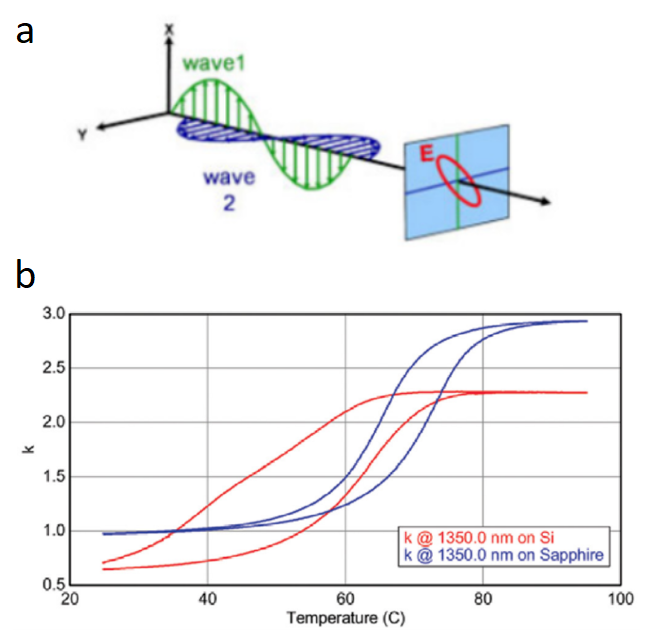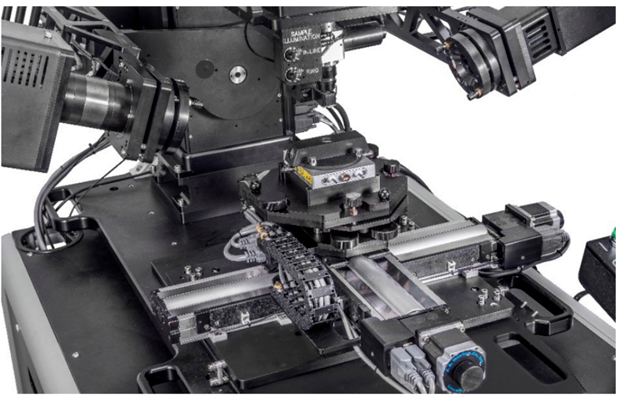As well as being an extremely effective standalone tool for thermomicrometric sample analysis, Linkam stages are frequently used to add temperature and environmental control to a variety of complementary techniques, from X-ray diffraction to ellipsometry and from fluorescence microscopy to Raman spectroscopy.
Each of these techniques demands careful experimental planning to guarantee correct analysis of a sample with the two devices working together, and Linkam regularly collaborates with other instrument manufacturers to offer industry-leading temperature control solutions across all of these techniques.
Taking a close look at one particular technique - ellipsometry – demonstrates how Linkam’s collaboration with ellipsometry experts J.A. Woollam facilitates accurate temperature and environmental control with a variety of Woollam ellipsometers.
Ellipsometry measures any variance in polarization state of a light beam transmitted or reflected from a material structure. This measurement is then utilized to determine the thin film and bulk material properties, with refractive index and layer thickness being the most frequently used applications.
Ellipsometry is also applied to establish composition, crystallinity, doping concentration, roughness and other material properties inherent in optical response changes.
The ability to measure nanometer-scale layers used in microelectronics was the application that put ellipsometry ‘on the map,’ but this technology has since seen an expansion in how it is utilized; from applications in research in physical sciences to flat panel display, semiconductor and data storage solutions, and from communications to biosensor and optical coating industries.

(a) Illustration of elliptically polarised light as used by an ellipsometer and (b) output from a temperature-controlled ellipsometry experiment, showing the coefficient ‘k’ as a function of temperature. Image Credit: Linkam Scientific Instruments Ltd.
Observations of phase transitions and transition temperatures are made possible by monitoring temperature-dependent optical properties. J. A. Woollam customizes its ellipsometers in line with the needs of individual users.
For instance, incorporating temperature-controlled modules which is particularly vital throughout the R&D process as it enables researchers to better understand how their materials behave as a function of temperature.
Jeremy Van Derslice of Woollam’s Applications Group outlines the considerations this demands, “When our customers are using ellipsometry for R&D, they themselves are usually working on something brand new, often requiring uniquely configured instrumentation. We do our best to accommodate customization requests from our customers and have built a business around that concept.”
J. A. Woollam and Linkam began talking through possible projects in 2013 before moving into outright collaboration in 2014. One of the advantages brought by the joint-expertise from each company is offering thin-film researchers personalized temperature-controlled ellipsometers. On this value, Jeremy states, “Based on the modular nature of our product line and requests from our customers, we often ask Linkam to modify a configuration.”

Linkam HFSEL600 temperature control stage mounted on the Woollam M-2000. Image Credit: Linkam Scientific Instruments Ltd.
The modular design of J. A. Woollam ellipsometers allows for the delivery of unique configurations, and working in close alliance with companies such as Linkam provides thin-film researchers with the ability to test their materials in novel ways.
The foundations of Linkam’s HFSEL600 temperature control stage are laid in the company’s standard ellipsometry stage, the THSMEL600. The HFSEL600 facilitates temperature-dependent ellipsometry measurements with all J. A. Woollam systems, such as the M-2000, IR-VASE, and RC2 instruments.
The heating stage is an enclosed system with optical windows enabling ellipsometry measurements to be taken at an angle of incidence of 70° -- it can also function as an open system with other angles of incidence. Commenting on the integration of these systems, Jeremy says:
“There are many applications where it becomes critically necessary to measure optical properties at different temperatures in real-time. For example, materials used on satellites launched into space where they are expected to function over a wide range of temperatures, or in silicon photovoltaic panels where the quantum efficiency is temperature-dependent. The HFSEL600 temperature-controlled ellipsometer stage from Linkam provides the ideal solution.”
The HFSEL600 is fully integrated into the J. A. Woollam CompleteEASE ellipsometry software package, enabling the user to save the respective temperature with each ellipsometry measurement and can be utilized in the model as a set point for the optical constants that correspond with it.
“Linkam has continued to work with us and our customers in adapting their temperature-controlled stages to suit the J. A. Woollam ellipsometers – we ask a lot of them in terms of modifying their solutions, and they do an excellent job of accommodating our requests. Linkam’s products are highly reliable, which is something we were seeking in order to maintain the integrity of our overall package.”
Incorporating ellipsometers with Linkam’s HFSEL600 heating stage for temperature control with extreme precision and accuracy provides the optimal instrumentation to determine versatile materials.
As with many of our collaborations, the initial discussion with Woollam was around our standard product. It soon became clear that due to the flexible nature of J. A. Woollam’s ellipsometry systems, we could offer a much better solution for the customer by developing a customized solution. We brought our R&D teams together, and even though working on different sides of the Atlantic, we were quickly able to develop a product that fully met their needs. Both companies pride themselves on providing high performance and quality solutions to their customers. This has made the collaboration particularly easy and fruitful.
Duncan Stacey, Sales and Marketing Director, Linkam.

This information has been sourced, reviewed and adapted from materials provided by Linkam Scientific Instruments.
For more information on this source, please visit Linkam Scientific Instruments.